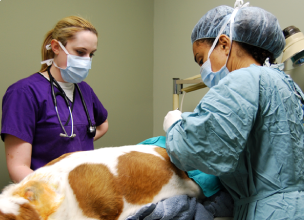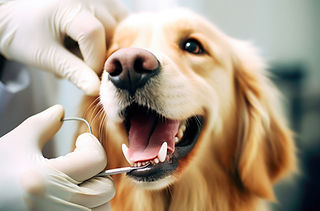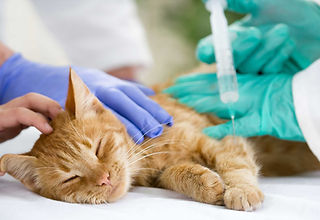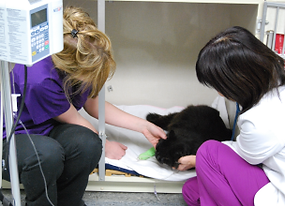
Pet Surgery in East Danforth and Toronto
Kato Animal Hospital offers elective and non-elective pet surgery in East Danforth and Toronto. Our dedicated team ensures the utmost care and precision in every procedure. We employ advanced techniques to prioritize the well-being of your beloved pets, using intravenous pumps and advanced monitoring devices to assess anesthetic depth, vital signs, and blood pressure throughout the surgical process.
Our passion for animals drives us to go above and beyond, treating your pets with the love and attention they deserve. As cherished members of your family, we are committed to enhancing their quality of life and promoting longevity. Reach out to us today for pet surgical solutions in Toronto. Your pet's well-being is our priority!
Full Range of Surgical Procedures for Your Pets
We understand that pet surgery can be a source of concern for both pet owners and their furry companions. Our experienced veterinarians are dedicated to providing exceptional care and keeping you informed throughout every process.
Here's what to expect during our full range of surgical procedures:

Consultation
We start with a consultation to evaluate your pet’s condition and determine the need for pet surgery. This includes reviewing medical history and conducting necessary diagnostic tests, allowing you to ask questions.
Anesthesia
Before surgery, we administer anesthesia to keep your pet comfortable, using monitoring equipment to track vital signs and ensure safety throughout the procedure.
Surgery
Our team performs various surgeries, from routine spaying and neutering to complex procedures like tumour removal and dental extractions, using precise techniques for effective outcomes.
Aftercare
Post-surgery, we provide instructions for pain management and care for the surgical site, along with follow-up appointments to monitor recovery and address any concerns.
We utilize advanced technology and state-of-the-art facilities to ensure the highest standards of surgical care for your pets. Whether your pet requires elective or non-elective surgery, our approach covers various health concerns. From routine spay/neuter surgeries to more complex interventions such as tumour removal and tooth extraction, we strive to enhance your beloved pets' overall health and longevity. Contact us today to learn more about our pet surgery treatment and book an appointment for your pet’s care.

Elective and Non-elective Surgeries
Elective surgery is an optional procedure that pet owners can request to benefit their pet’s overall health, such as spaying and neutering. Non-elective surgery, however, is necessary to restore a pet's health or correct a condition that would interfere with its life. Some of the elective and non-elective pet surgeries we offer in Toronto include:
Elective Pet Surgery
Spaying and neutering are surgical procedures used to prevent pets from reproducing. Neutering means castration, the removal of the testicles of a male animal, whereas spaying means removing the uterus and ovaries of a female animal. In addition to preventing unwanted offspring, spaying or neutering offers many health and behavioural benefits, including lowering the risk of reproductive cancer and aggressive behaviour in the future.
Non-Elective Pet Surgery
Tumour removal
Mammary tumours are most common in female animals, especially those not spayed. Like skin tumours, mammary tumours can be benign or malignant, and removal involves several tests and procedures. In dogs, mammary tumours are most often mixed, containing benign and malignant cells. Because these can turn malignant, surgery is the usual recommendation. Tissue biopsies can be performed to determine the type of mammary tumour.


Dental surgery is essential for maintaining your pet’s oral health. Common procedures include tooth extractions, particularly in cases where your pet suffers from malocclusion, which is the misalignment of the jaws. This can lead to difficulty eating or chewing. Our veterinary team will diagnose and evaluate your pet’s dental health and, if necessary, refer more complex cases to a veterinary dentist. Whether realignment or extractions, we prioritize your pet's dental well-being. If your pet is experiencing a toothache or chewing difficulties, contact us for pet surgery in East Danforth.
Wound suturing
Many pets require some form of wound and suture management. Healing should not be delayed due to the pet's intervention, such as licking and biting at sutures. Even calm and quiet pets tend to nibble at the incision or bandage. We provide ways to help protect wounds and sutures.
Bladder stone removal
Bladder stones are solid mineral deposits inside the bladders of cats and dogs. Non-surgical methods include increasing water intake and prescription diets. Our Toronto veterinarians will perform a thorough physical examination, X-rays, and urinalysis to diagnose bladder stones. After the surgery, recovery can take 2-4 weeks.
Removing foreign bodies from the intestines
Foreign bodies occur when pets consume items that will not pass through their gastrointestinal tract. Surgical intervention may be required.
Orthopedic surgery
Orthopedic surgery is necessary to address issues with your pet’s bones, joints, or ligaments. This category includes treatments for conditions like fractures or hip dysplasia. Pet orthopedic surgery at our clinic is referred out to specialty practices that are highly skilled in doing these procedures regularly. After the exam and diagnosis, we can refer you to a skilled veterinary surgeon.
Emergency surgery
Emergency surgeries are often required to save your pet's life in critical situations. Our veterinarians will perform diagnostic tests to determine the most suitable action. Don’t delay in any emergency; contact us for pet surgery in East Danforth to prevent further complications. In case we cannot accommodate an emergency, we will find a referral clinic for you.
Hospitalization and Treatment
Following a surgical procedure, Kato Animal Hospital can house pets who are in stable condition. Our warm, quiet cages with soft bedding, intravenous fluid pumps and assorted diets keep your pet comfortable. Our staff members do their utmost to make your pet's stay as comfortable and stress-free as possible. If your pet requires 24-hour care, we’ll give you a referral.


Preparing Your Pet for a Safe Surgery
Proper preparation helps ensure a safe surgical experience for the pet undergoing surgery:
-
Fasting guidelines: Most pets must fast for 8–12 hours before surgery to reduce the risk of complications during anesthesia. Our team provides precise instructions based on your pet’s age, size, and health status.
-
Pre-surgical evaluation: Routine blood work, physical examinations, and diagnostic tests are performed to assess your pet’s overall health and suitability for surgery.
-
Medication review: Bring a list of your pet's medications, supplements, or special diets. Certain medications may need to be adjusted prior to surgery.
-
Comfort and transport: Ensure your pet is calm and secure during transport. We advise using a secure carrier or leash and limiting stressful interactions before arrival.
-
Arrival instructions: Please arrive at the clinic at the scheduled time. Our team aims to provide clear instructions on drop-off procedures to streamline the surgical process.
Supporting Your Pet after Surgery
Key areas of post-surgical care include:
-
Rest and confinement: Pets should be kept in a quiet, comfortable environment with minimal physical activity for the duration recommended by the veterinarian.
-
Wound monitoring: Check surgical sites for redness, swelling, discharge, or other signs of infection. Report any concerning changes to the clinic promptly.
-
Medication administration: Administer all prescribed medications exactly as instructed, including pain relief and antibiotics.
-
Nutrition and hydration: Encourage gentle eating and regular access to water. Depending on the type of surgery, special diets may be recommended.
Managing Your Pet’s Comfort and Pain
Keeping your pet comfortable is key to a smooth recovery and overall well-being. Our team offers personalized pain management plans, including:
-
Prescription medications: Pain relief medications are tailored to your pet’s size, and overall health. Our team provides instructions for safe administration.
-
Observation: Monitor pets for signs of pain, such as vocalization, restlessness, or reluctance to move. If pain appears uncontrolled, immediate consultation is advised.
-
Adjunct therapies: Sometimes, cold or warm compresses, massage, or approved physical therapy can support recovery.
-
Long-term pain monitoring: Chronic pain may develop after certain surgeries. Regular check-ins with the veterinarian ensure ongoing comfort and well-being.
What emergencies call for surgical intervention?
Examples of situations calling for immediate pet surgery include:
Pet Surgery in Toronto | FAQs
Why Choose Us for Pet Surgery
Our team aims to provide safe, professional, and compassionate care for every surgical procedure. Here is why clients choose us for pet surgery in East Danforth:
1. Compassionate and Professional Veterinary Team
At Kato Animal Hospital, our team is driven by a genuine love for animals. Each member is highly trained and dedicated to providing compassionate care during every check-up, procedure, and surgery. With years of experience, our veterinarians have the expertise to handle diverse surgical cases, ensuring your pets receive the best possible care.
2. Comprehensive Services for Complete Pet Care
We are not just a pet surgery facility but a full-service animal hospital in Toronto. Our commitment extends beyond surgical procedures to wellness exams, vaccinations, X-rays, and more. Whether your pet requires preventive care or specialized surgical interventions, our comprehensive services cover all aspects of your pet's health.
3. 40+ Years of Expertise
With over four decades of experience, Kato Animal Hospital has been a pillar of reliable veterinary services in Toronto. Founded by Dr. Christine Kato in 1982, our hospital has consistently provided top-notch pet care, earning the community's trust. Our long-term staff members, many with over a decade of service, reflect our commitment to building lasting relationships with our clients.
4. Individualized Approach to Pet Care
We understand that every pet is unique and has different healthcare needs. Our veterinarians take an individualized approach, tailoring our services to meet each pet's specific requirements. From regular examinations to preventive care, we prioritize personalized attention to ensure the well-being of your furry friends.
Choose Kato Animal Hospital for pet surgery in East Danforth and Toronto. Here, expertise meets compassion, and your pet's health is our top priority. Contact us today to schedule a consultation and ensure the best possible outcome for your furry family members.


